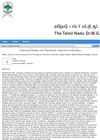 August 2024 in “Skin Research and Technology”
August 2024 in “Skin Research and Technology” Omega-6 and LDL cholesterol increase the risk of hair loss.
[object Object] 
Melanoma characteristics vary by age, which could help doctors with diagnosis and prevention.

The study concluded that hirsutism is most common in women aged 14 to 48, often caused by PCOS, and can be effectively treated with Nd YAG laser and IPL.
 July 2012 in “Hair transplant forum international”
July 2012 in “Hair transplant forum international” Lifestyle choices like stress, smoking, heavy drinking, sun exposure, and chemical hair treatments might speed up hair loss in people with androgenetic alopecia.
15 citations,
July 2021 in “JAMA Dermatology” Androgenetic alopecia negatively affects quality of life and self-esteem, especially in women, but not depression.
 10 citations,
March 2016 in “The Journal of Obstetrics and Gynecology of India”
10 citations,
March 2016 in “The Journal of Obstetrics and Gynecology of India” The article suggests renaming Polycystic Ovarian Syndrome (PCOS) to "Hyperandrogenic Persistent Ovulatory Dysfunction Syndrome" (HA-PODS) for accuracy and consistency, but no final decision was made.
9 citations,
May 2019 in “Medicine” The C-allele and CC-genotype in the PTPN22 gene lower the risk of alopecia areata.
8 citations,
December 2013 in “The journal of investigative dermatology. Symposium proceedings/The Journal of investigative dermatology symposium proceedings” Mouse models help understand alopecia areata and find treatments.
 4 citations,
October 2022 in “Nutrients”
4 citations,
October 2022 in “Nutrients” Personalized diets, like the Mediterranean Diet and low carb diets, can help manage PCOS symptoms in obese women, and probiotics may enhance weight loss and improve metabolic health. More research is needed to find the best diet strategies.
 1 citations,
February 2022 in “PLOS ONE”
1 citations,
February 2022 in “PLOS ONE” Hair loss is more common in male Chinese college freshmen, and it's linked with rosacea but doesn't affect their quality of life.

Drinking sweetened tea and soda and poor sleep may increase the risk of hair loss in women.
 April 2024 in “Frontiers in microbiology”
April 2024 in “Frontiers in microbiology” Certain gut bacteria may increase or decrease the risk of male pattern baldness.
 November 2023 in “Journal of cosmetic dermatology”
November 2023 in “Journal of cosmetic dermatology” Fat transplants using a patient's own fat can rejuvenate and repair tissues effectively.
 August 2023 in “Frontiers in Endocrinology”
August 2023 in “Frontiers in Endocrinology” Mutations in mitochondrial DNA might significantly contribute to the development of Polycystic Ovarian Syndrome.
 March 2022 in “Wound practice & research”
March 2022 in “Wound practice & research” New treatments for alopecia areata show promise, but standardized guidelines are needed.
951 citations,
December 2013 in “Clinical epidemiology” PCOS is a common hormonal disorder in women that can be managed with lifestyle changes and various medications.
717 citations,
June 2010 in “Nature” Alopecia areata involves both innate and adaptive immunity, with specific genes linked to the disease.
[object Object] 58 citations,
January 2010 in “Arthritis Care & Research” Hydroxychloroquine may help delay skin damage in lupus patients.
35 citations,
April 1993 in “Clinics in dermatology” Rosacea is a common skin condition mainly causing facial redness.
8 citations,
July 2020 in “Clinical, cosmetic and investigational dermatology” Excessive sun protection might cause frontal fibrosing alopecia by disrupting skin immune balance.
 5 citations,
November 2022 in “Animal Genetics”
5 citations,
November 2022 in “Animal Genetics” Genomic research can help improve the quality and production of natural fibers in animals.
3 citations,
June 2017 in “Reproductive biomedicine online” A certain mutation in the fetal alpha 5-reductase gene is linked to a higher risk of late miscarriage.
 1 citations,
July 2023 in “Journal of Clinical Medicine”
1 citations,
July 2023 in “Journal of Clinical Medicine” Different causes of beard hair loss have various treatments, including medications, lifestyle changes, and procedures to stimulate hair growth.
 1 citations,
June 2021 in “Journal of gynecology and womens health”
1 citations,
June 2021 in “Journal of gynecology and womens health” The study found that PCOS affects about 6.5-6.8% of women in both urban and rural areas of Telangana, India, and highlighted the importance of lifestyle changes for management.
 1 citations,
December 2017
1 citations,
December 2017 The study suggests that treating early hair loss with Nourkrin® with Marilex® can help prevent further hair loss and may be linked to reducing the risk of lifestyle diseases.
 December 2024 in “PLoS ONE”
December 2024 in “PLoS ONE” Hair growth serums A and C can affect hair growth genes and pathways, suggesting potential for personalized hair loss treatments.
 December 2024 in “Nutrients”
December 2024 in “Nutrients” Skin, hair, and nail changes can help detect eating disorders early.
Early diagnosis and personalized treatment are crucial for managing pediatric androgenetic alopecia.
 October 2024 in “International Journal of Molecular Sciences”
October 2024 in “International Journal of Molecular Sciences” Rosa rugosa extract promotes hair growth and could be a natural treatment for hair loss.
 September 2023 in “Medicina-lithuania”
September 2023 in “Medicina-lithuania” The study suggests that analyzing DNA can help treat hair loss, but more research is needed.




















